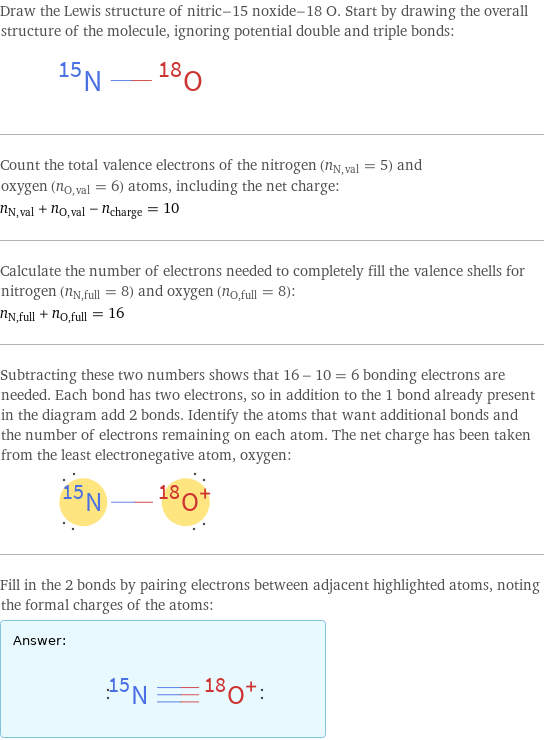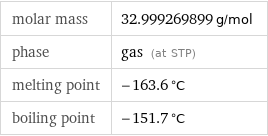Input interpretation

nitric-15 noxide-18 O
Chemical names and formulas

formula | ^15N^18O Hill formula | (15N)(18O)+ name | nitric-15 noxide-18 O mass fractions | O (oxygen) 0.545% | N (nitrogen) 0.455%
Lewis structure

Draw the Lewis structure of nitric-15 noxide-18 O. Start by drawing the overall structure of the molecule, ignoring potential double and triple bonds: Count the total valence electrons of the nitrogen (n_N, val = 5) and oxygen (n_O, val = 6) atoms, including the net charge: n_N, val + n_O, val - n_charge = 10 Calculate the number of electrons needed to completely fill the valence shells for nitrogen (n_N, full = 8) and oxygen (n_O, full = 8): n_N, full + n_O, full = 16 Subtracting these two numbers shows that 16 - 10 = 6 bonding electrons are needed. Each bond has two electrons, so in addition to the 1 bond already present in the diagram add 2 bonds. Identify the atoms that want additional bonds and the number of electrons remaining on each atom. The net charge has been taken from the least electronegative atom, oxygen: Fill in the 2 bonds by pairing electrons between adjacent highlighted atoms, noting the formal charges of the atoms: Answer: | |
Basic properties

molar mass | 32.999269899 g/mol phase | gas (at STP) melting point | -163.6 °C boiling point | -151.7 °C
Units

Gas properties (at STP)

vapor density | 1.05 (relative to air)
Non-standard atom properties

O-18 | 1 N-15 | 1
Chemical identifiers
![CAS number | 14706-82-2 PubChem CID number | 16213266 PubChem SID number | 24871968 SMILES identifier | N#[O+] InChI identifier | InChI=1/NO/c1-2/q+1/i1+1, 2+2 MDL number | MFCD00084229](../image_source/7c6e4395173b3364b1c66eadce31adc6.png)
CAS number | 14706-82-2 PubChem CID number | 16213266 PubChem SID number | 24871968 SMILES identifier | N#[O+] InChI identifier | InChI=1/NO/c1-2/q+1/i1+1, 2+2 MDL number | MFCD00084229